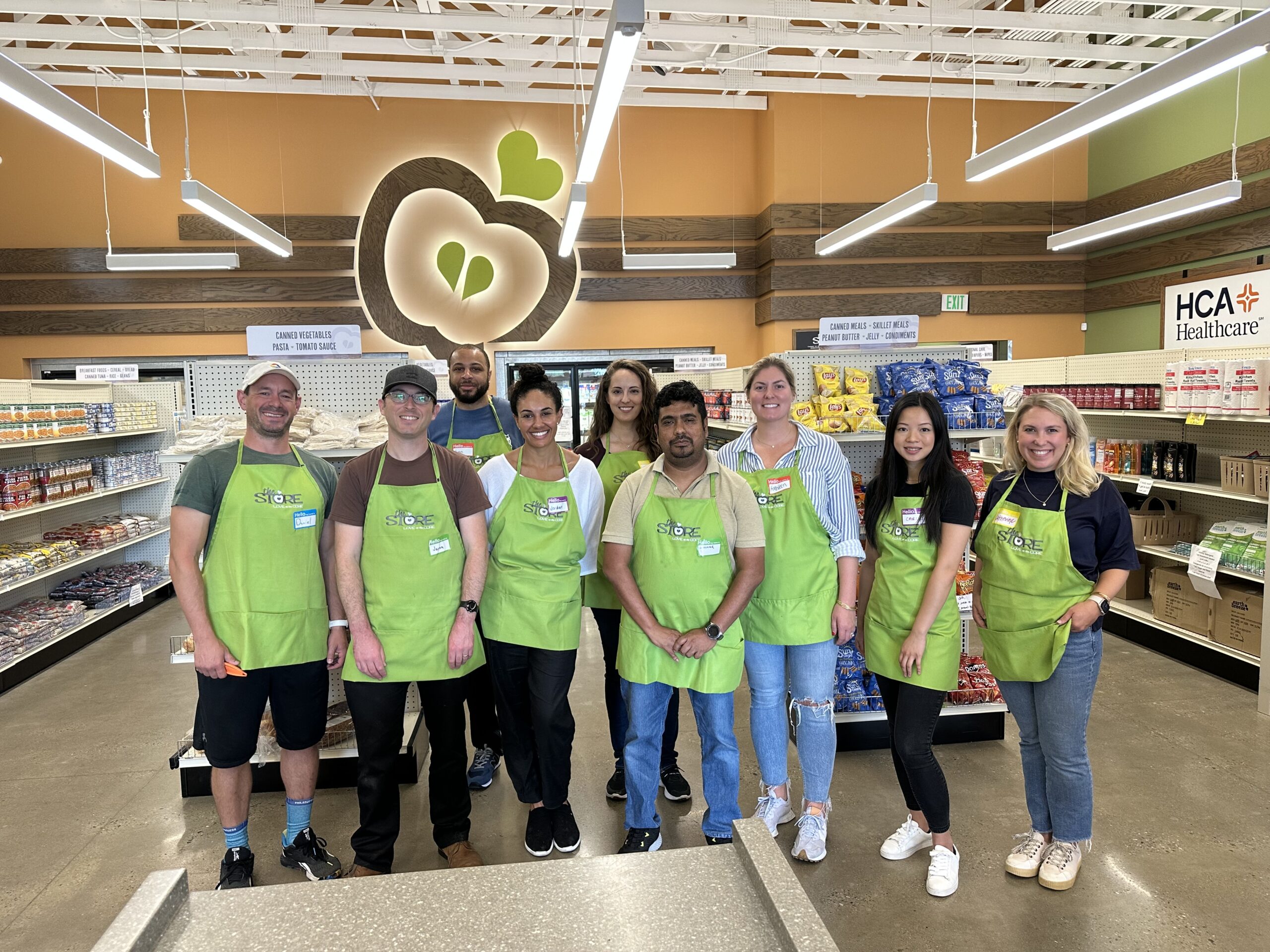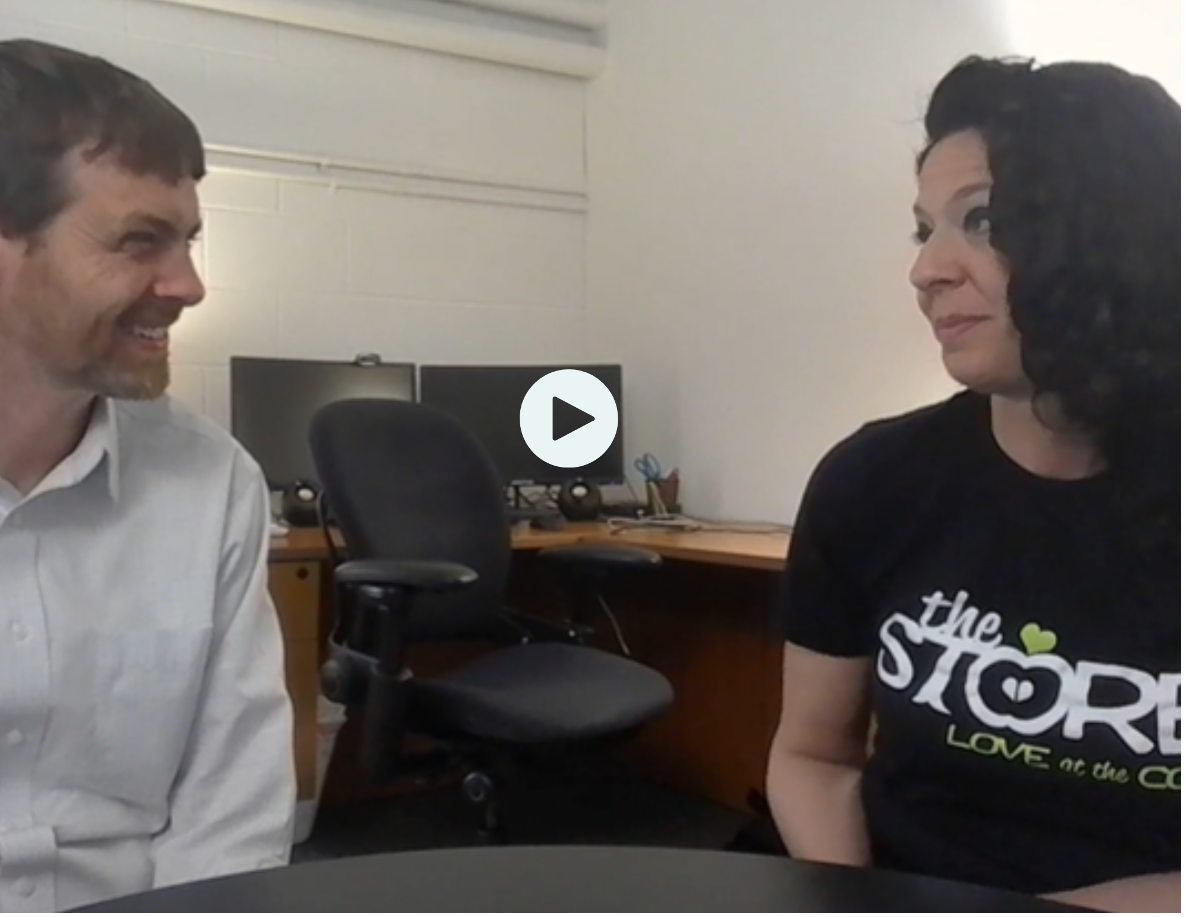We Nashvillians are people who dream big and have big hearts. We envision a community where everyone prospers, where all share in the city’s successes, and where each and every person who lives here feels included and feels like their voice matters. This vision is at the heart of Imagine Nashville, a transformative initiative that seeks to reshape our city into a place that truly reflects the dreams and aspirations of all its residents. As the CEO of The Store, an organization that is seeking to transform the way food insecurity is addressed, I was immediately drawn to Imagine Nashville’s work and vision.
To be honest, I wasn’t very familiar with the initiative until a few months ago when the actual data came out—but from what I’ve learned, I have no doubt that the Imagine Nashville project is just what Nashville needs right now. Imagine Nashville is not just another city planning project; it is a movement grounded in the belief that collective dreaming and practical planning can create a future that honors every citizen. To realize this vision, the initiative has engaged in an unprecedented level of community research, reaching across geographic, socioeconomic, racial, ethnic, and generational divides to gather a comprehensive understanding of what residents desire and require to feel a sense of belonging in their city.
Through a series of 1:1 interviews, weeklong online community conversations, and extensive survey research, Imagine Nashville has tapped into the pulse of the city. The effort made to include often underrepresented populations—such as young people, older adults, and residents from every neighborhood and ZIP code—ensures that the initiative’s findings and subsequent actions are deeply rooted in the community’s actual needs and dreams.
The insights gathered reveal that Nashvillians cherish their city’s vibrant cultural scene, characterized by an array of dining, shopping, and entertainment options, along with abundant parks and creative spaces. However, the research also uncovers pressing concerns: a significant portion of the population feels disconnected from the economic growth and cultural buzz, voicing needs that extend beyond amenities to more fundamental aspects of daily living, such as safety, affordability of food and housing, and inclusivity.
Equipped with this data, Imagine Nashville aims to craft a shared vision that addresses these disparities and builds on the unique strengths of our city. The initiative, in partnership with the Community Foundation of Middle Tennessee, plans to make all collected data accessible on an open-access platform, further democratizing information and fostering transparency in how decisions are made. This level of transparency, collaboration, and vision is just what our community needs.
Imagine Nashville stands as a beacon of hope and a testament to what can be achieved when a city comes together to dream and plan collectively. It represents a bold step toward creating a Nashville that not only grows but does so in a way that all who call it home can thrive together.
The Reality of Growth: Challenges and Disparities
As Nashville continues to flourish, the city’s rapid growth brings both unprecedented opportunities and significant challenges. While many residents celebrate the vibrant expansion, Imagine Nashville’s research has shone a light on the stark disparities that accompany this growth. Despite a general sense of positivity among Nashvillians—65% view aspects of living in Nashville favorably—the data reveals a troubling divide.
A majority of low-income families feel that they are not sharing in the city’s successes, with 57% reporting a sense of exclusion from Nashville’s economic and cultural boom. Indeed more than half of our neighbors with low incomes feel left out! This sentiment is particularly pronounced among older adults and minority groups, who are often left behind as the city advances. These findings underscore a critical gap between the city’s prosperity experienced by some and the much starker reality experienced by its more vulnerable populations.
Key concerns that have emerged include a growing divide between the rich and poor, with 72% of residents perceiving that leaders are prioritizing investments poorly, focusing on areas that don’t benefit the majority. Issues like traffic congestion, lack of affordable housing, and insufficient public transportation have been highlighted as the most impactful on residents’ quality of life, yet these are the very areas where Nashville is seen to be underperforming. A significant 49% of residents cite traffic and congestion as top negative impacts on their lives, followed closely by the housing crisis and the high cost of living, which of course includes rising food costs—an area we at The Store are particularly concerned about.
This sentiment is reflected in the perspective that while Nashville’s growth is seen as bringing more benefits if managed carefully, currently, only 29% of adults and 35% of youth feel that this growth is enhancing their quality of life. Moreover, most residents agree that while Nashville is a hub of creativity and entertainment, these are not enough to improve the overall living conditions that matter most to them.
The Imagine Nashville initiative has also highlighted the importance of strong neighborhoods over a concentrated city center. Residents believe that the future success of the city will rely on a network of robust communities where essential amenities like grocery stores, parks, and effective transportation systems are accessible to all, not just a select few. A full 84% of those surveyed insisted that access to grocery stores is very important or essential to the success of neighborhoods; indeed, access to groceries was the number one finding in what makes our neighborhoods thrive. This finding shines a light on the numerous food desserts spread throughout our city.
As Nashville navigates this pivotal moment, the insights provided by Imagine Nashville offer a crucial blueprint for ensuring that the city’s growth does not exacerbate existing disparities but instead fosters a more inclusive and equitable environment for all its residents.
Uniting for Change: Community Movements and The Store’s Impact
In Nashville, the escalating cost of living, particularly the rising cost of groceries, poses significant challenges, exacerbating the food insecurity faced by many of its residents. The findings from the Imagine Nashville initiative highlight these challenges, revealing a pressing need for inclusive growth and equitable access to essentials like food. As the challenges posed in the study may feel daunting, I find hope in seeing the many organizations and community movements that are bringing an inclusive vision and showing the community what Nashville at its best can look like. Since my professional focus right now is addressing food insecurity in Nashville, I draw particular inspiration from organizations like Second Harvest Food Bank, The Nashville Food Project, the Tennessee Justice Center, and of course, The Store, all of which are making pivotal strides in bridging divides and fostering community cohesion in the area of food insecurity.
Second Harvest Food Bank of Middle Tennessee is a long-time leader in the movement, providing not only access to nutritious food but also dignity and a sense of community to those they serve. Second Harvest has been instrumental in distributing millions of pounds of food across Middle and West Tennessee, ensuring that those facing hunger receive the necessary support through a robust network of partners and programs. This effort is complemented by their extensive outreach through mobile pantries and emergency food boxes, crucial in reaching a diverse demographic including children, families, and seniors.
The Nashville Food Project has carved a unique niche by focusing on bringing people together to grow, cook, and share nourishing food, thus strengthening community ties and addressing food insecurity head-on. They engage in innovative practices such as recovering food, cultivating community gardens, and mobilizing volunteers to prepare and distribute meals, emphasizing sustainability and social cohesion. Their programs particularly shine by integrating community members in every step of the food cycle, from field to table.
Simultaneously, The Tennessee Justice Center plays a critical role in nutritional advocacy, focusing on protecting and strengthening federal nutrition programs like SNAP, WIC, and child nutrition programs. Their work is vital in ensuring that low-income families, children, and other vulnerable groups have continuous access to essential food resources. Through their efforts in policy advocacy and direct client services, the Tennessee Justice Center addresses barriers to program access and advocates for systemic solutions, helping to maintain a strong nutrition safety net in Tennessee.
Finally, The Store is defying traditional methods of food distribution by embracing a model that prioritizes dignity and choice. Unlike conventional food banks that often pre-package food supplies for recipients, The Store operates more like a supermarket, allowing individuals and families to select the foods that meet their specific preferences and dietary needs. This approach not only respects the individuality of each customer but also reduces waste, as people take only what they know they will use.
By offering an environment that mirrors a typical grocery store, The Store eliminates the stigma often associated with food aid. Shoppers can browse through aisles stocked with fresh produce, meats, dairy products, and other essentials, which helps maintain a sense of normalcy and self-esteem—crucial elements often overlooked in traditional food aid programs. This setting also fosters a more supportive community atmosphere, where volunteers and staff can interact positively with customers, offering nutritional advice and assistance in a respectful manner.
The Store’s innovative approach extends beyond food distribution. It incorporates comprehensive support services designed to address the root causes of food insecurity and poverty. These services include financial literacy classes, nutrition education, and even cooking classes, which empower customers to make informed choices about their health and economic well-being. This holistic strategy not only feeds bodies but also nourishes minds, paving the way for a more sustainable solution to poverty and hunger in Nashville.
These organizations collectively enhance their impact by focusing on community-based approaches that foster inclusivity and support. The Store, for instance, not only offers a grocery shopping experience but also integrates financial literacy and nutrition education, acknowledging the broader needs of its customers. Such comprehensive services are crucial in a city where many are battling the dual challenges of food scarcity and high living costs.
Moreover, these initiatives facilitate community building and social cohesion by bringing people together around the cause of food security. They play a significant role in making Nashville a more inclusive city, where growth and prosperity are accessible to all. By supporting these organizations, Nashvillians contribute to a more equitable community, ensuring that as the city grows, it does so with compassion and inclusivity at its core.
Through their dedicated efforts, The Store, Second Harvest, The Nashville Food Project, and the Tennessee Justice Center exemplify the powerful impact of community-driven responses to systemic issues. Their work not only addresses immediate needs but also builds long-term resilience and community strength, proving essential in Nashville’s journey toward being a city that truly embodies growth and equality for all its residents.
Engage and Empower: How You Can Contribute to Nashville’s Future
As Nashville navigates through its growth and addresses the challenges highlighted by the Imagine Nashville initiative, there are numerous ways for residents and businesses to get involved and make a meaningful impact. Active participation in community movements, like those led by the organizations above and so many others, is crucial for fostering a more inclusive and supportive Nashville. Since I know best the opportunities to contribute at my nonprofit, The Store, I’ll suggest different ways to get involved with us, while acknowledging that exceptional nonprofits throughout our community all offer opportunities for caring people to engage in their work to build a better Nashville.
For those looking to make a direct, tangible contribution, The Store offers several engagement opportunities. One impactful way is through volunteering. Volunteers are the backbone of The Store, helping to manage the grocery floor, support shoppers, and ensure a welcoming environment. This hands-on involvement is not only rewarding but also essential for the day-to-day operations of The Store. Most importantly, since our volunteer opportunities bring together caring volunteers with people experiencing food insecurity, these opportunities help bridge the divide that Imagine Nashville talks about and create community among people of all income levels.

Another way we have created to lift up very low-income families struggling with food insecurity is by sponsoring a family’s groceries. This program allows individuals or groups to provide direct assistance to families in need, ensuring they have access to healthy and nutritious food. Sponsorship can alleviate the financial burden on families struggling to make ends meet, making a lasting difference in their lives. Small gestures like this empower our community to make possible in another family’s life the same thing we all want for our families: that they will be able to meet their basic needs in a dignified, caring environment.
Additionally, The Store frequently hosts Lunch and Learn sessions. These events are designed to educate attendees about the mission of The Store, the underlying issues of food insecurity, and how integrated support services can transform lives. They provide an excellent opportunity for community members to learn more about the challenges facing their neighbors and explore ways to help. For those moved by the Imagine Nashville work, I can think of no better way to respond than to choose an issue—like food insecurity, homelessness, or unemployment—and commit to learn more. The Store’s Lunch and Learns enable our neighbors to do just that.

Responding to the broader Imagine Nashville movement, residents can also advocate for policies that support equitable growth and strengthen community services. Engaging with local government, participating in city council meetings, and supporting initiatives that promote inclusivity are vital steps in ensuring that all Nashvillians can share in the city’s prosperity.
By taking these tangible steps—volunteering, sponsoring, attending educational events, and engaging in advocacy—every person can contribute to a stronger, more inclusive Nashville. The combined efforts of individuals and organizations like The Store not only address immediate needs but also build the foundation for long-term solutions that will enable all residents to thrive.
Together, through our collective action and shared commitment, we can ensure that Nashville’s growth benefits everyone and that our city remains a beacon of community and hope. Join us in making a difference today, for a better Nashville tomorrow.




2 Responses
Your post is an indispensable resource on this subject, thanks!
This post has provided a wealth of knowledge, much appreciated.